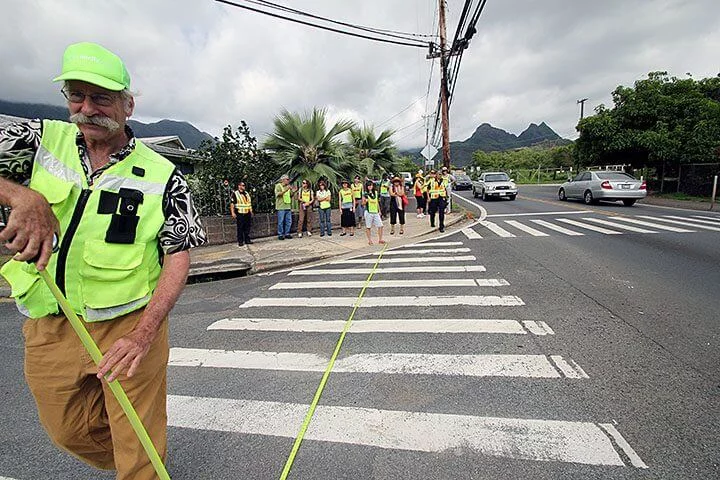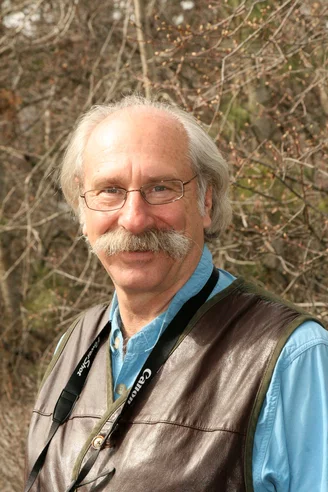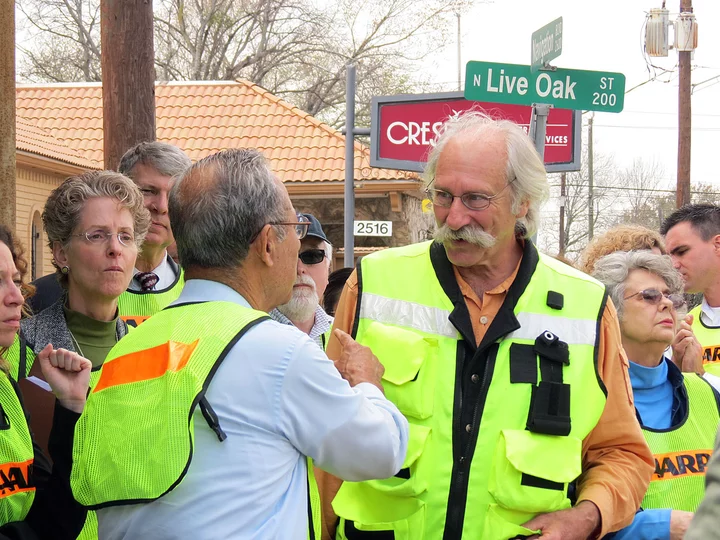Burden is coming to Humboldt to help make our communities more walkable | Images provided by Burden
With all the recent talk about creating more housing in Humboldt and projects like Arcata’s Gateway Area Plan, Eureka’s Waterfront Plan and the McKinleyville Town Center Plan in the works, you’ve probably heard the term “walkability” thrown around a bit, and keep hearing how these plans are being designed to prioritize bikes and pedestrians over cars and parking.
But how exactly do we make our communities more walkable? Well, that’s where Dan Burden comes in. Burden, an internationally recognized transportation and walkability expert, has more than 45 years of experience in transportation planning/ engineering, urban design and public engagement and has hosted thousands of walkability audits and transportation studies across the country.
And Burden’s next stop just happens to be our own cozy corner of the world. On July 22 through 25, Burden will host walks in several Humboldt towns, helping city planners and members of the community with ideas on how to make our communities more pedestrian-friendly. He’d like you to walk with him.
“Walkability is really about building communities so that people have a choice in transportation and aren’t always forced into getting into a car to make a trip,” Burden told the Outpost in a phone interview on Thursday afternoon. “For many people that’s not affordable…And it’s a huge cost to society to have to build the full systems for cars that just keep getting bigger and longer and wider.”
Burden, who currently resides in Port Townsend, Wash., has been pursuing his field since he was a teenager who loved bicycling and realized that he wanted to help build other people’s love for bicycling too. After studying recreation sciences and interpersonal communications at the University of Montana, Burden eventually landed a job as the first State Bicycle and Pedestrian Coordinator for the Florida Department of Transportation. In 1996 Burden started his own organization, Walkable Communities, Inc., focused on building cities that prioritize people, rather than cars. He has since visited more than 3,500 cities around the country, helping policymakers create more walkable environments. You can view Burden’s impressive resumé here.)
Burden was recently invited by the Humboldt County Association of Governments (HCAOG) to bring his expertise to some of our local communities – Arcata, Eureka, Blue Lake and McKinleyville. Each town’s officials selected an area they wanted to focus on and provided Burden with background information on the various projects planned for these areas and some of the traffic and pedestrian-related issues the towns are facing. Burden will host separate walking audits in each of these areas, followed by presentations he will compile to lay out his recommendations.
The first walk will be held in Arcata on Saturday, July 22 from 10 a.m. to noon, and will focus on the area surrounding 11th and K Streets, in the part of town that has come to be known as the Gateway Area, after the town’s ambitious Gateway Area Plan, which aims to bring rezone the area to facilitate the development of high-density housing and mixed-used developments.
Later that day, from 1 to 3 p.m., Burden will host a walk audit in McKinleyville, focusing on Central Avenue. The McKinleyville Municipal Advisory Committee (MMAC) has been working to develop the McKinleyville Town Center Master Plan, which aims to create a thriving town center, with retail shops, parks and that encourages bicycle and pedestrian travel.
On Sunday, July 23, Burden will make his way to Eureka, hosting a walk from 11 a.m. to 1 p.m. that will focus on the Old Town Area, and on Tuesday, July 25, Burden will guide a walk in Blue Lake from 12 to 1 p.m.
Burden said that his expertise and outsider perspective helps him notice issues that might have been overlooked. He’s also familiar with a wide range of tools that can be used to address these challenges and often provides communities with options that had not been previously considered.
“I teach people to see things with a new set of eyes that they walk past all the time but don’t notice,” Burden said. “Once we know what the issues are we’ll be able to start a robust public engagement process.”
Burden during a walkability audit in Houston
What exactly will Burden be looking for during these walks? Well, he focuses on a range of issues, including traffic flow and safety. One of Burden’s frequent approaches is what he refers to as “road diets,” which is an approach to traffic management that focuses on taking things away from the roads, rather than adding more.
One example of a “road diet” is reducing the number of lanes on a road. Often when traffic has become congested in an area, planners will decide that the best option is to add more lanes. However, while adding more lanes does sometimes calm traffic initially, it does not usually help in the long run. Burden often recommends removing some of the lanes, making more room for bicycles and pedestrians and slowing traffic.
Burden says that when it comes to reducing traffic congestion, it is actually more effective to focus on the intersections. One approach that Burden often suggests is converting traditional four-way intersections into roundabouts, which have been shown to reduce traffic congestion. “A roundabout can carry 30 to 50 percent more traffic per lane than a signal can,” Burden said.
Another way Burden suggests improving intersections and calming traffic is through curb extensions. Expanding the size of curbs and sidewalks, Burden said, can slow down drivers when they are taking turns (making the intersection safer) and also create a shorter distance for pedestrians to cross the street.
Burden also focuses on parking issues, something that has been a hot-button topic, especially surrounding some of Eureka’s and Arcata’s development plans. Burden said that many cities will tell him they have a “parking problem,” when what they really have is a “parking management problem.” Burden often works with cities to identify ways to better manage parking by finding spaces that can be used for parking and encouraging cities to install meters in busy areas.
Of course, Burden supports the idea of deprioritizing parking in general, and wants to encourage people to visit areas by walking, biking or using public transportation. Encouraging people to walk in communities not only supports healthier lifestyles, but also encourages more social interaction and helps encourage patronage of local shops and other businesses.
“When we do the wrong thing with traffic, we’re destroying businesses,” Burden said. “We’re destroying the social life of our communities.”
Burden’s walks and presentations are free and open to the public. If you’re interested, you can view a complete schedule of Burden’s walks and presentations and contact information for each city here.



CLICK TO MANAGE